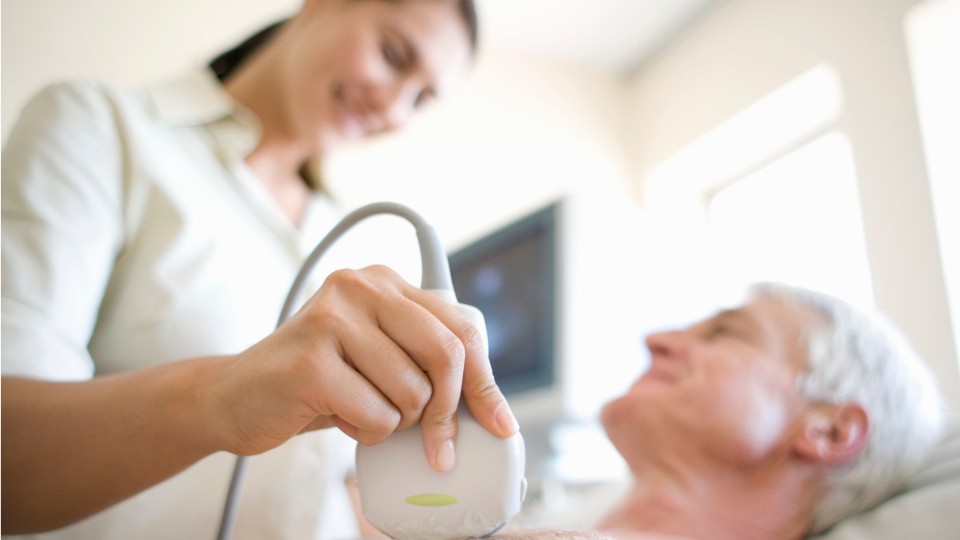Cardiovascular Technologist & CVTs
Cardiovascular Technologist & CVTs
Career Overview
Cardiovascular technologists and technicians operate electrocardiogram and other electronic equipment to record cardiac activity of patients to aid in the diagnosis and treatment of heart disease.
Education
Completing a two-year college program or four-year bachelor's degree in cardiovascular technology may be necessary to obtain these positions.
Future Outlook
Employment of cardiovascular technologists and technicians, including vascular technologists, is projected to grow 5 percent from 2019 to 2029, faster than the average for all occupations. As the large baby-boom population ages, the need to diagnose medical conditions—such as blood clots and heart disease—will likely increase. Imaging technology is a tool used in making these diagnoses.
Work Environment
Cardiovascular technologists and technicians work predominantly in lab and hospital settings. Sometimes they are also found in private clinics.
Recommended High School Courses
- Math
- Physics
- Science - as much as possible, including biology!
- Anatomy
- Active Learning - Understanding the implications of new information for both current and future problem-solving and decision-making.
- Active Listening - Giving full attention to what other people are saying, taking time to understand the points being made, asking questions as appropriate, and not interrupting at inappropriate times.
- Complex Problem Solving - Identifying complex problems and reviewing related information to develop and evaluate options and implement solutions.
- Coordination - Adjusting actions in relation to others' actions.
- Critical Thinking - Using logic and reasoning to identify the strengths and weaknesses of alternative solutions, conclusions or approaches to problems.
- Instructing - Teaching others how to do something.
- Judgment and Decision Making - Considering the relative costs and benefits of potential actions to choose the most appropriate one.
- Monitoring - Monitoring/Assessing performance of yourself, other individuals, or organizations to make improvements or take corrective action.
- Operation and Control - Controlling operations of equipment or systems.
- Operation Monitoring - Watching gauges, dials, or other indicators to make sure a machine is working properly.
- Reading Comprehension - Understanding written sentences and paragraphs in work related documents.
- Science - Using scientific rules and methods to solve problems.
- Service Orientation - Actively looking for ways to help people.
- Social Perceptiveness - Being aware of others' reactions and understanding why they react as they do.
- Speaking - Talking to others to convey information effectively.
- Time Management - Managing one's own time and the time of others.
- Writing - Communicating effectively in writing as appropriate for the needs of the audience.
- Computers and Electronics - Knowledge of circuit boards, processors, chips, electronic equipment, and computer hardware and software, including applications and programming.
- Customer and Personal Service - Knowledge of principles and processes for providing customer and personal services. This includes customer needs assessment, meeting quality standards for services, and evaluation of customer satisfaction.
- Education and Training - Knowledge of principles and methods for curriculum and training design, teaching and instruction for individuals and groups, and the measurement of training effects.
- English Language - Knowledge of the structure and content of the English language including the meaning and spelling of words, rules of composition, and grammar.
- Medicine and Dentistry - Knowledge of the information and techniques needed to diagnose and treat human injuries, diseases, and deformities. This includes symptoms, treatment alternatives, drug properties and interactions, and preventive health-care measures.
- Arm-Hand Steadiness - The ability to keep your hand and arm steady while moving your arm or while holding your arm and hand in one position.
- Category Flexibility - The ability to generate or use different sets of rules for combining or grouping things in different ways.
- Control Precision - The ability to quickly and repeatedly adjust the controls of a machine or a vehicle to exact positions.
- Deductive Reasoning - The ability to apply general rules to specific problems to produce answers that make sense.
- Finger Dexterity - The ability to make precisely coordinated movements of the fingers of one or both hands to grasp, manipulate, or assemble very small objects.
- Flexibility of Closure - The ability to identify or detect a known pattern (a figure, object, word, or sound) that is hidden in other distracting material.
- Inductive Reasoning - The ability to combine pieces of information to form general rules or conclusions (includes finding a relationship among seemingly unrelated events).
- Information Ordering - The ability to arrange things or actions in a certain order or pattern according to a specific rule or set of rules (e.g., patterns of numbers, letters, words, pictures, mathematical operations).
- Manual Dexterity - The ability to quickly move your hand, your hand together with your arm, or your two hands to grasp, manipulate, or assemble objects.
- Near Vision - The ability to see details at close range (within a few feet of the observer).
- Oral Comprehension - The ability to listen to and understand information and ideas presented through spoken words and sentences.
- Oral Expression - The ability to communicate information and ideas in speaking so others will understand.
- Perceptual Speed - The ability to quickly and accurately compare similarities and differences among sets of letters, numbers, objects, pictures, or patterns. The things to be compared may be presented at the same time or one after the other. This ability also includes comparing a presented object with a remembered object.
- Problem Sensitivity - The ability to tell when something is wrong or is likely to go wrong. It does not involve solving the problem, only recognizing there is a problem.
- Selective Attention - The ability to concentrate on a task over a period of time without being distracted.
- Speech Clarity - The ability to speak clearly so others can understand you.
- Speech Recognition - The ability to identify and understand the speech of another person.
- Speed of Closure - The ability to quickly make sense of, combine, and organize information into meaningful patterns.
- Time Sharing - The ability to shift back and forth between two or more activities or sources of information (such as speech, sounds, touch, or other sources).
- Written Comprehension - The ability to read and understand information and ideas presented in writing.
- Written Expression - The ability to communicate information and ideas in writing so others will understand.
- Operate diagnostic or therapeutic medical instruments or equipment.
- Test patient heart or lung functioning.
- Explain medical procedures or test results to patients or family members.
- Analyze test data or images to inform diagnosis or treatment.
- Maintain sterile operative fields.
- Monitor patient conditions during treatments, procedures, or activities.
- Assist healthcare practitioners during surgery.
- Monitor video displays of medical equipment to ensure proper functioning.
- Operate diagnostic imaging equipment.
- Collect medical information from patients, family members, or other medical professionals.
- Record patient medical histories.
- Calculate numerical data for medical activities.
- Inform medical professionals regarding patient conditions and care.
- Position patients for treatment or examination.
- Prepare patients physically for medical procedures.
- Perform clerical work in medical settings.
- Administer medical substances for imaging or other procedures.
- Prepare reports summarizing patient diagnostic or care activities.
- Adjust settings or positions of medical equipment.
- Enter patient or treatment data into computers.
- Prepare medical supplies or equipment for use.
- Examine medical instruments or equipment to ensure proper operation.
- Maintain medical equipment or instruments.
- Repair medical facility equipment.
- Supervise patient care personnel.
- Train medical providers.
- Order medical supplies or equipment.
- Schedule patient procedures or appointments.
Approx Salary Expectation
References
Trend Analysis - Explorer the Market, Labour Market Information, Government of Canada https://www.jobbank.gc.ca/trend-analysis.
O*NET OnLine, National Center for O*NET Development, https://www.onetonline.org/.


